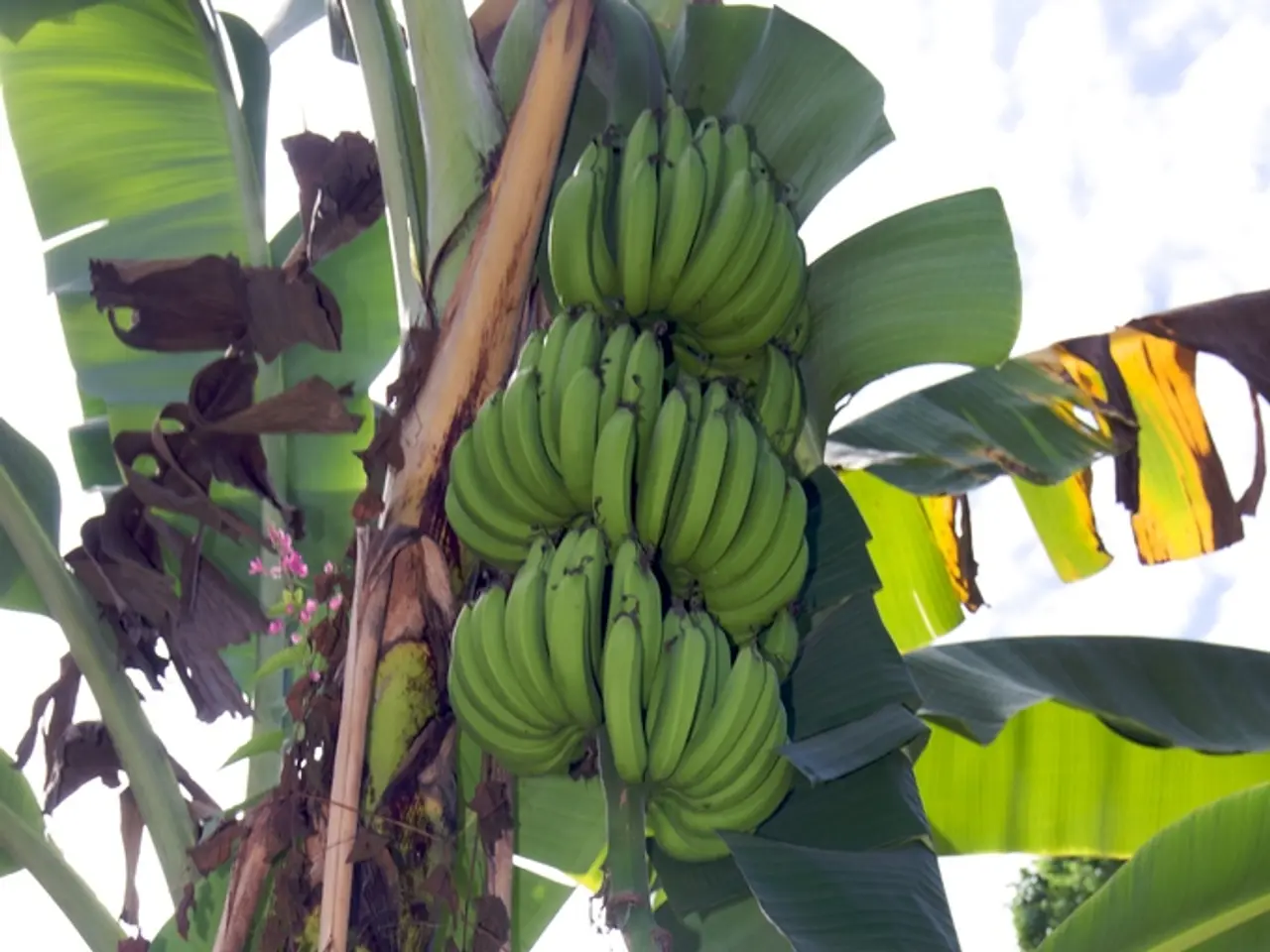World banana growth faces impending threat, spurring Del Monte to fortify protective measures
In the face of a global banana production shortage, Fresh Del Monte is taking decisive action to ensure its continued supply and combat the threats posed by fungal diseases such as Black Sigatoka and Fusarium Tropical Race 4 (TR4).
The company's chairman and CEO, Mohammad Abu-Ghazaleh, discussed the shortage on Fresh Del Monte's Q2 earnings call, highlighting the need for stringent biosecurity measures, climate-resilient farming practices, and exploration of disease-resistant banana varieties.
To address the issue, Fresh Del Monte is implementing a multi-faceted approach. This includes the establishment of clear biosecurity protocols across its farms to prevent the introduction of TR4, as well as the validation of these practices through extensive trials to ensure they deliver meaningful, measurable impact.
In response to Black Sigatoka, Fresh Del Monte is focusing on improving water management, enhancing plant distribution methods, and promoting proper spacing to support better sunlight exposure, reduce excess moisture, and support effective chemical application. The company is also actively seeking varieties with tolerance to TR4.
In terms of climate change, Fresh Del Monte has significantly adapted its agricultural practices. This includes implementing a range of agronomic improvements, such as better conditions for plant growth, improved drainage systems, and promoting soil health through cover crops, organic inputs, and smarter irrigation practices. One of Fresh Del Monte's active developments for banana cultivation is in Somalia.
Fresh Del Monte is also collaborating with the Queensland University of Technology and Tropic to obtain banana lines for testing. The company is not disclosing specific details about the technology being used for TR4-resistant gene-edited banana lines at this time.
The global banana shortage is primarily due to the spread of fungal diseases, particularly Black Sigatoka and TR4, in key growing regions. Costa Rica, for instance, has experienced a 23% reduction in banana production as of May 2025, with a loss of 12.4 million boxes, due to adverse weather conditions and Sigatoka-related issues. Other regions, such as Colombia and Peru, have reported both Black Sigatoka and TR4, while other countries in the region have not confirmed the presence of TR4.
The strategies to combat these fungal threats involve a combination of biological solutions, developing and deploying resistant banana varieties, cautious chemical use, and adapting to changing climate conditions. Ongoing research is focused on gene-edited resistant bananas as a promising advance against TR4.
In contrast, other regions have not yet reported significant production losses from Black Sigatoka, but there has been a noticeable increase in fungicide application cycles to maintain control.
Fresh Del Monte's proactive approach and commitment to innovation position it well to navigate these challenges and continue delivering high-quality bananas to consumers around the world.
- In the realm of environmental science, Fresh Del Monte is implementing stricter biosecurity measures and climate-resilient farming practices to cope with fungal diseases affecting banana production, such as Black Sigatoka and Fusarium Tropical Race 4 (TR4).
- Beyond bananas, Fresh Del Monte is also partnerships with the Queensland University of Technology and Tropic to explore gene-edited banana lines as a potential solution for TR4 resistance, demonstrating a forward-thinking approach in the field of science and technology.
- Aware of the need for innovation in their industry, Fresh Del Monte's business model is focused on the adoption of cutting-edge practices, including the development and deployment of disease-resistant banana varieties and the use of technology to combat fungal threats like Black Sigatoka and TR4.
- As a responsible corporate entity, Fresh Del Monte is committed to education and self-development, investing in ongoing research to create resistant banana varieties, contributing to the general news and discussions surrounding food security and environmental challenges in the agricultural sector.




